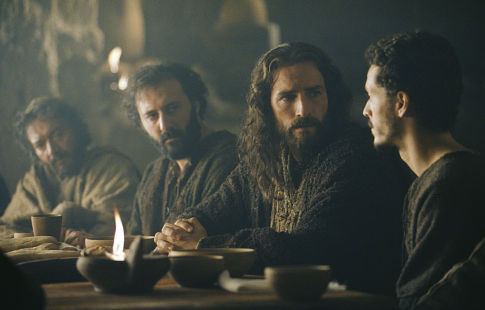 I think we all agree that the churchyard sign posing the question, "ARE YOU READY TO DIE?" isn't the most fresh or relevant way for a passerby to engage with the gospel.
I think we all agree that the churchyard sign posing the question, "ARE YOU READY TO DIE?" isn't the most fresh or relevant way for a passerby to engage with the gospel. There is little doubt that the "corporation" stands out as the dominant power in today's society. And, everyone knows one of the most important practices of any successful corporation is marketing. It should not be surprising, then, that many Christians are looking to Jesus and wondering what His earthly ministry might have to say, if anything, about marketing.
There is little doubt that the "corporation" stands out as the dominant power in today's society. And, everyone knows one of the most important practices of any successful corporation is marketing. It should not be surprising, then, that many Christians are looking to Jesus and wondering what His earthly ministry might have to say, if anything, about marketing.
 een immensely successful. Classic brands like Old Spice have followed suit.
een immensely successful. Classic brands like Old Spice have followed suit. Product and Price
As far as product is concerned Jesus has the market cornered. Eternal life is kind of a big deal. Let's face it. Unless Jesus comes back very soon, none of us will make it out of this place alive. Eternal life fills an essential need and represents great value to, not just a demographic, but the entire world. As far as product goes, Jesus is master!
Closely linked to product value is product cost. If a product represents high value to the customer then it can logically be attributed a high cost. In Mark 8:34, Jesus communicates the cost to, not only his disciples, but a large crowd of people, "If anyone would come after me, he must deny himself and take up his cross and follow me." This and many other passages unabashedly and clearly communicate the cost. You must die. Spiritually and/or physically--you must give up your life. Talk ab out sticker shock!
out sticker shock!
So wait, has Jesus failed to measure up? Is this a marketing mistake? Is the cost too high? Mark 8:34 is qualified to some degree in John 12:25: "whoever loves his life loses it, and whoever hates his life in this world will keep it for eternal life."
The nuances here are important and C.S. Lewis' musings on this concept are enlightening. In Mere Christianity, Lewis explains that what we identify with as our selves is really an accumulation of selections made from ideas and values that the world has placed before us. In a sense, we are giving up who we think we are. The reason we find life in giving these things up is because we don't know who we are.
As we follow Christ into death, we follow Him into the hands of our Creator. Who could reveal to us our identity, but the one who formed it? A common post-conversion experience is that in giving up perceived liberties in sex, money, and a host of other forms of sovereignty, one finds them to have been the shackles of slavery. The list price is actually our debt. Jesus, essentially, makes it possible for us to place that debt in the hands of the creator by showing us the way to the cross and dying for our sins.
We are not being sold a product at all; we are being given the opportunity to accept a gift and discover who we are as God's good creation. This flies in the face of something essential to marketing. Products, or ideas being marketed, should always represent value to both parties. God needs nothing from us. He gains nothing from restoring us to himself. The benefit is completely ours. It is true love. It is the real stuff that evangelicalism should be made of. If marketing is directed toward bringing value to the church as well as the customer, it will always fail.
 ondary to our commitment to bring love and healing to the communities in which God has placed us.
ondary to our commitment to bring love and healing to the communities in which God has placed us. Now what of Place and Promotion?
Place and Promotion
God's promotional decisions were strange from their onset. Good promotion often consists of identifying a group of influencers within a demographic. By targeting these individuals, the company can anticipate that they will in turn influence others to purchase the product. Fairly early on in Genesis, God reveals himself to a tiny nation with no military and a serious lack of influence. They experience slavery and years of wandering in the desert.
 The promotion of the incarnation takes on the same character. A young girl out of wedlock becomes pregnant in what seems to the world to be a scandal, and angels proclaim the miraculous birth to a group of rural shepherds. Upon birth the child is laid in a trough used for feeding animals. The only glimpse of influencers comes in the form of gift bearing wise men, most likely kings, but they travel from different cultures and return to their kingdoms never to be heard from again. Many of us had hoped that Mel Gibson might have been a sort of media king, laying gifts at the feet of the King of kings after he gifted the world with the Passion of the Christ. However, years in the film's wake, his witness has proved to be highly privatized if at all existent.
The promotion of the incarnation takes on the same character. A young girl out of wedlock becomes pregnant in what seems to the world to be a scandal, and angels proclaim the miraculous birth to a group of rural shepherds. Upon birth the child is laid in a trough used for feeding animals. The only glimpse of influencers comes in the form of gift bearing wise men, most likely kings, but they travel from different cultures and return to their kingdoms never to be heard from again. Many of us had hoped that Mel Gibson might have been a sort of media king, laying gifts at the feet of the King of kings after he gifted the world with the Passion of the Christ. However, years in the film's wake, his witness has proved to be highly privatized if at all existent.
Still, like Father, like Son. Jesus goes about things the same way. He calls fishermen to be his disciples and associates with prostitutes and lepers. What kind of marketing is this? Well, these choices are more brilliant than they may first appear. Jesus was at work selecting the first to enter the Kingdom of God and the first witnesses to the cross and the resurrection. He needed a group of people that could believe in what they would proclaim -- people that could enter the Kingdom and accept its crucified King. "The last will be first, and the first last."(Mt 19:30; 20:16; Mk 10:31; Lk 13:30) is an oft repeated phrase in the synoptic gospels.
Luke recounts Jesus' teachings concerning the meek: "Blessed are you who are poor, for yours is the kingdom of God. Blessed are you who are hungry now, for you shall be satisfied. Blessed are you who weep now, for you shall laugh." Who can accept the coming of genuine justice better than someone who has been unjustly treated and left hungry, anticipating someone who will advocate on their behalf?
We see this again and again in the psalms as Israel cries out for the day that God will hold court and deliver her from the hands of her oppressors. Who can accept the need for the power structures of the world to be brought under scrutiny better than those that have suffered under their reign? Who better to understand the indifference brought on by large sums of money than those who have been snubbed by the apathetic hearts of the rich?
day that God will hold court and deliver her from the hands of her oppressors. Who can accept the need for the power structures of the world to be brought under scrutiny better than those that have suffered under their reign? Who better to understand the indifference brought on by large sums of money than those who have been snubbed by the apathetic hearts of the rich?
Jesus initially presented the Kingdom to those already filled with longing for justice, peace, and righteousness. Thus, the spread of the gospel is attributed to its veracity, its merit and the power of the Holy Spirit - not the targeting of influential people. As we continue to build marketing teams into the structure of our churches, we must keep these values in mind.
Jesus changed the world not by swaying the influential, but by caring for the ones they neglect. He did so not by dressing himself up like other kings, but by acting like a true king should, and joining the suffering people of the world. We need to be sure that our message, regardless of the marketing vehicle which drives it, stands on the life-changing merits of the gospel and the power of the Holy Spirit.
Ultimately, we need our marketing to be secondary to our role as Christ's body in the world. We should focus first on joining those that are suffering and let our sound-bites and trendy marketing images serve as floodlights directing people into our healing arms. This is the paradigm laid out by the true Marketing Master.

